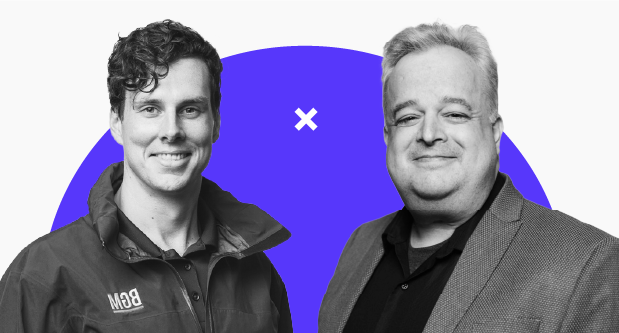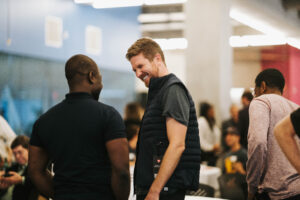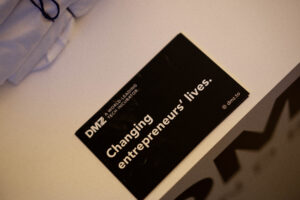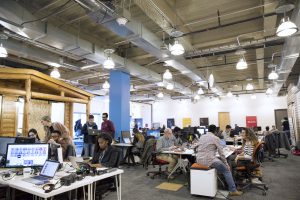As an early-stage founder, it’s all about your customers. Want to create a unique product? Looking to catalyze your startup? Ready to soar above the competition? Strong customer relationships are your golden ticket to business success.
Think customer values, needs, and wants. Is your product or service truly hitting the mark? There’s no one better to ask than your customers. Establishing relationships with users is a key competitive advantage — from real-time suggestions and feedback to brand advocacy and word-of-mouth marketing.
But it doesn’t stop there; the benefit goes both ways. Organizations working with early-stage startups get access to innovative products and services catered to their specific needs. Agile startups move fast, and recommendations are met swiftly.
It’s a win-win!
We sat down with Leonard Ivey, Co-Founder of Softdrive (DMZ Incubator ‘23) and Michael Robinson, Chief Technology Officer at The Plus Group, to discover how they harness the power of relationships to drive business innovation and success.
Leonard, what inspired you to found Softdrive?
My professional career started in the architectural engineering construction industry (AEC). I held various roles at several companies within the AEC industry.
There was a common theme at all of these organizations: the computer experience I had or the computer solutions I was given were not adequate for me to be productive in my day. Unfortunately, anytime I asked for a computer upgrade, IT responded with, ‘We don’t have the budget’ or ‘We’re stuck within a three-year provisioning cycle,’ leaving me unproductive and frustrated. This wasn’t IT’s fault, it was just the reality.
Alan Daniels [Softdrive’s Co-Founder] and I chatted about computer issues at our jobs and how we could improve the experience. We brainstormed and looked at the incumbents in the space but couldn’t find an adequate solution for the experience or price, so we built Softdrive in 2019.
Michael, what intrigued you about working with an early-stage startup?
At The Plus Group, we enable staff to work from anywhere. A couple of years ago, we were looking into VDI [Virtual Desktop Infrastructure] software, previously called Remote Desktop. Over the years, I would test different VDIs, but I never found a solution where I could feel the difference.
A year into the pandemic, Leonard approached us. We tested their software, and although it was very new, it was fast.
They proposed a partnership where we would test their software and give feedback. Of course, there were kinks, but Softdrive always keeps improving. We’ve rolled out Softdrive to two architects, and now we’ve begun rolling it out to other companies in our portfolio. They love it.
Leonard, what are the benefits of working so closely with a customer?
Our relationship has evolved to where The Plus Group directly influences and advises our roadmap. Michael is easy to chat with and the nicest individual, but he’s pretty no-bulls**t. Having a CTO as a resource that we can tap into who’s also your customer is awesome. It’s the best of both worlds. It’s very much a partnership.
Michael, how does working with tech startups drive innovation in your organization?
The Plus Group is one of the big three in architecture for residential design. We’re a forward-thinking company constantly pushing the boundaries of where we can take technology. When the COVID-19 pandemic hit, we transitioned everyone to virtual seamlessly within 12 hours. You should always try new things and position yourself to take on anything.
We had a problem with an architect who couldn’t open a large file. With Softdrive, we took the load time from 12 minutes to just 30 seconds. He told me it saved him time from working on the weekend. The savings are significant.
Being able to log in anywhere, do anything, and pick up right where you left off without having a physical computer is the future.
“At the beginning of your entrepreneurial journey,
your customers are everything.”
– Leonard Ivey, Co-Founder, Softdrive
Leonard, how do you grow and foster your customer relationships?
At the beginning of your entrepreneurial journey, your customers are everything. You have to learn from them and treat them as if they are royalty. Some things may give you pause and think, is this better for the organization, or is this just a customized feature that will only help them?
Besides that brief pause, you must listen and work with your customers. Otherwise, your organization will end up like any other enterprise product.
Try to touch base with your customers frequently without annoying them. Have as many open channels of communication as possible — phone, text or slack channels — and always be sure to get back to them immediately. They are the lifeblood of your organization, treat them as such and give them the best possible experience.
Softdrive is a cloud pc software redefining the personal computer. They leverage the power of cloud computing and fast internet speed to stream a computer to any device. Check it out >
The Plus Group combines digital marketing with architectural design and real estate software to revolutionize the real estate industry. Learn more >





 A marketing technology entrepreneur with over 12 years of experience, Nathaniel is an ambitious founder with a strong interest in creating and participating in innovative ideas, projects, and products that impact the world in a positive way.
A marketing technology entrepreneur with over 12 years of experience, Nathaniel is an ambitious founder with a strong interest in creating and participating in innovative ideas, projects, and products that impact the world in a positive way. LiveGauge is an experiential marketing suite that helps brands and agencies better understand how effective their campaigns are.
LiveGauge is an experiential marketing suite that helps brands and agencies better understand how effective their campaigns are.




